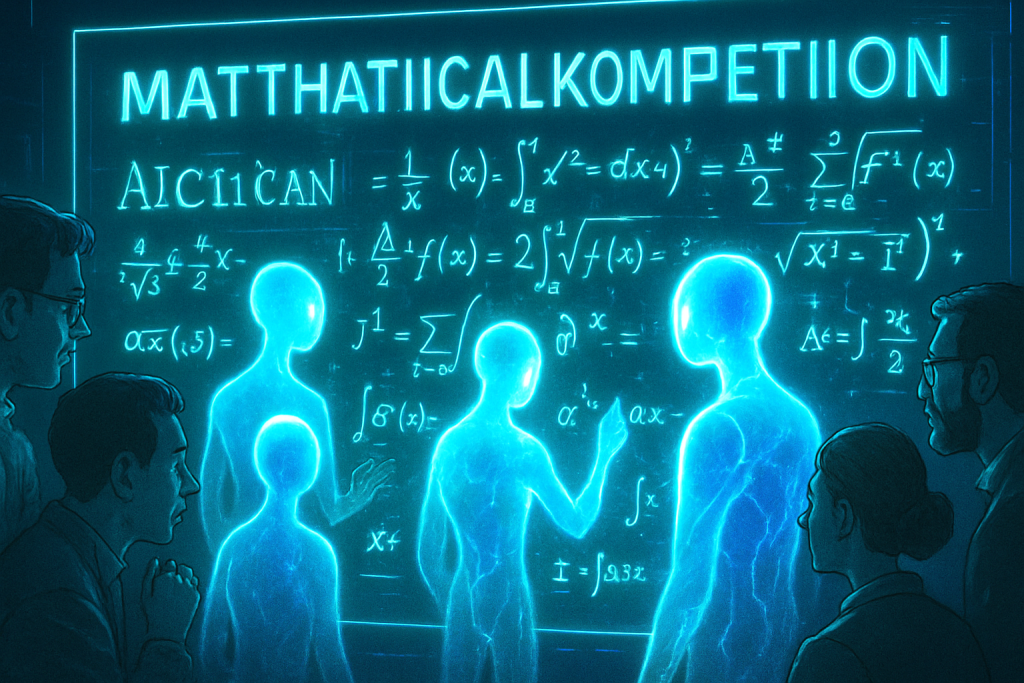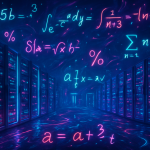The year is 2025. Flying cars still haven’t quite taken off (though that drone delivery of your artisanal kombucha is pretty sweet), but something far more profound just happened. Google and OpenAI just dropped a bombshell: their AI models clinched gold medals at the International Mathematical Olympiad (IMO). Yes, that IMO- the one where teen prodigies bend reality with numbers and theorems, the intellectual arena where future Fields Medalists sharpen their minds.
For years, the IMO has been a hallowed ground for human ingenuity, a celebration of the human brain’s capacity for abstract thought. Think of it as the math world’s Olympics, only instead of speed and strength, it tests logic, creativity, and sheer problem-solving grit. But now, silicon is muscling in on the action, and it’s not just participating; it’s winning.
The implications are staggering. We’re not just talking about AI acing your calculus homework anymore. We’re talking about machines capable of tackling truly complex mathematical problems, the kind that have stumped the best human minds for decades, sometimes centuries. Remember Deep Blue defeating Kasparov in chess? This feels bigger. Chess, for all its complexity, is still a closed system. Math is…well, math is the language of the universe itself.
So, how did this happen? How did AI go from calculating tips to conquering the IMO? Let’s break it down.
The winning models, Google’s Gemini Deep Think and OpenAI’s unnamed contender, leveraged what’s known as general-purpose reasoning. Forget the old-school approach of feeding AI mountains of data in formal languages (think complex coding). These models “think” in natural language. They read the problem, process it, and formulate a solution, all using the same kind of language you’re reading right now. It’s like teaching a super-smart parrot to not just mimic words, but to actually understand and apply them to solve incredibly difficult puzzles.
Google’s Gemini Deep Think went even further, completing the problems within the official 4.5-hour time limit, operating entirely in natural language. That’s like asking a friend to help you with a Rubik’s Cube, and they not only solve it, but they do it blindfolded and while reciting Shakespeare. Impressive, right?
But the real kicker is this: These AI models solved five out of six problems. That’s enough for gold, baby! This isn’t just about bragging rights; it’s about a fundamental shift in how we approach mathematical research. As Junehyuk Jung, a mathematics professor at Brown University and visiting researcher at Google’s DeepMind, pointed out, this natural language capability could unlock new avenues for collaboration between AI and human mathematicians. Imagine a future where mathematicians and AI work hand-in-hand, brainstorming ideas, testing hypotheses, and pushing the boundaries of knowledge together. It’s like Batman and Oracle, but with theorems instead of villains.
And speaking of collaboration, the IMO itself officially recognized and coordinated with AI developers this year, formally validating the AI’s performance. This is a big deal. It’s a sign that the math world is not only acknowledging AI’s potential but actively embracing it.
But let’s not get carried away just yet. This isn’t the singularity; it’s a milestone. There are still plenty of unsolved problems that remain beyond the reach of even the most advanced AI. Think of the Riemann Hypothesis, a problem that has bedeviled mathematicians for over 150 years. But this achievement at the IMO suggests that AI is rapidly closing the gap, and the implications for scientific discovery are immense. From developing new drugs to designing more efficient energy systems, the potential applications are virtually limitless.
Of course, with great power comes great responsibility. The rise of AI in mathematics raises some important ethical and philosophical questions. Will AI eventually replace human mathematicians? Probably not entirely. But it will likely transform the field, changing the way mathematicians work and what they focus on. We may see a shift towards more creative, strategic thinking, with AI handling the more tedious and computationally intensive tasks. It’s like the difference between a master craftsman and a power tool- the tool enhances the craftsman’s abilities, but it doesn’t replace them.
And then there’s the financial angle. Companies like Google and OpenAI are pouring billions of dollars into AI research, and this success at the IMO is sure to fuel further investment. Expect to see a surge in AI-powered tools and platforms for mathematical research, with companies vying to become the go-to provider for mathematicians and scientists around the world. The economic impact could be enormous, potentially creating new industries and transforming existing ones.
In the end, the AI gold medals at the IMO are more than just a cool headline. They’re a glimpse into the future, a future where AI and humans work together to unlock the secrets of the universe. It’s a future that’s both exciting and a little bit daunting, but one thing is certain: the world of mathematics, and indeed the world itself, will never be the same.
Discover more from Just Buzz
Subscribe to get the latest posts sent to your email.


